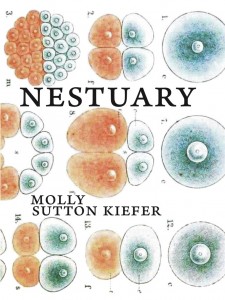97 Pages, $15
Reviewed by Jen Lambert
Reading Molly Sutton Kiefer’s Nestuary is like getting a glimpse into the inner workings of the maternal hive: that sacred colony of sleeping and feeding, the sweet wing beats of purpose and ritual, and those tiny humming bodies. The days are swift and ephemeral, but Sutton Kiefer reminds of the intensity, the warm, buzzing socket where drowsy becomes the new wake state,
This tunnel is my home. Eye-locked, wintered-in.
We build a fire to keep the melt. My body warms to theirs;
I am no longer the tinder but the fire itself.
We nestled in, we shipped, we rode that blue sea…We were mapping
the body and its new workings.
Like a body, or a womb, this book has a darkness, a churning current that is unflinching and fierce. This truth about the biology of our bodies is that they are messy and unpredictable and baring in the ways they receive and deliver life. Sutton Kiefer honestly and eloquently details her own infertility and birth story alongside the voices of other mother figures, mythological and contemporary. Every female voice in the collection, and there are many, is a vessel, a carrier, a giver. Nestuary sings of this sometimes dehumanizing function and of the powerful fixation on the internal workings of a woman. There are spells and incantations, headless pregnant women, brain dead mothers kept on life support to tend their growing fetuses, and pages of struggle, of women feeling failed by their own dysfunctioning bodies,
I am wicked to my body.
I lean in to the mirror sometimes and say, I hate
you I hate you Ihateyou.
But there is also hope and magic and light,
I imagine the night sky properly disrobed, leaving only the
chips of light and blackest black. I imagine a woman in
white swallowing the bulb of the moon, wearing it at her
center.
And there is joy and wild love, of pregnancy, of birth, and of sweet, delicious babies,
Is it permissible to swallow your daughter’s limbs? I want
to wallow them into my maw like a fish, sluuuuuup. I
want to feel her little thighs against the pulp of my
mouth.
I press my nose to her skin and breathe. And breathe.
The movement and rhythm of this collection, the release of time and order, the weaving of the stories, the rocking back and forth through dreams, through legend, through song creates a trancelike, dreamy state. Every page is something new, a list, a reference, a conversation, a quote, all poetic, all unpredictable, all breathtaking in execution and originality. The book shifts between the real and the unreal, and exposes the manipulation of meaning,
[nest]
adj. pocketlike, holder of little blond eggs
n. the make of sticks, of feathers-from-your-hair,
brittle last-year’s leaves
v. bottoming out, carrying, belly-to-belly and fleshed
adj. that secret pleasure of down, windy eggs
n. a home for toys, as in nesting dolls, the center a
prize, pling!
v. deposit some treasure
Definitions, figures, and phone conversations become interpreted versions of themselves, translations of sorrow and hope in mother tongue. These pieces perfectly represent that narrow, obsessive vision in the land of baby. The fantastical reasoning that nothing else matters beyond the mechanics of the body and the suckle of a newborn.
The Doctor Leaves Messages
Voicemail Four.
Your body carved of stone, your convex mirror. Inside of
you is a cave, lonely. Sometimes, when we come to a close,
there is an echo, as if nothing happened at all. Ping of
pellet against flesh-wall and flesh-wall singing back, dull
hum to the edge of the world.
I admire Sutton Kiefer’s skill in constructing this stunning hybrid, the ability to change form, to shape shift so effortlessly and keep me spellbound. I was never distant from her voice, never distracted. Nestuary is everything I love about poetry, the ecstasy and despair of human suffering displayed with such surprise, such beauty, and such craft. I’ve read many collections that sing the song of motherhood, but this is one I will return to again and again anytime I have a yearning for that maternal hive, that warm cave, that nest.
***
Jen Lambert is a founding editor of burntdistrict and Spark Wheel Press, and her work has been published in a variety of journals and anthologies including most recently The Los Angeles Review, Boxcar Poetry Review, and Raleigh Review. A fellow at the Virginia Center for Creative Arts, Jen is currently living in Newfoundland with her husband and three wildly beautiful children.
![[PANK]](http://pankmagazine.com/wp-content/themes/pank/assets/images/pank-logo-large.png)

